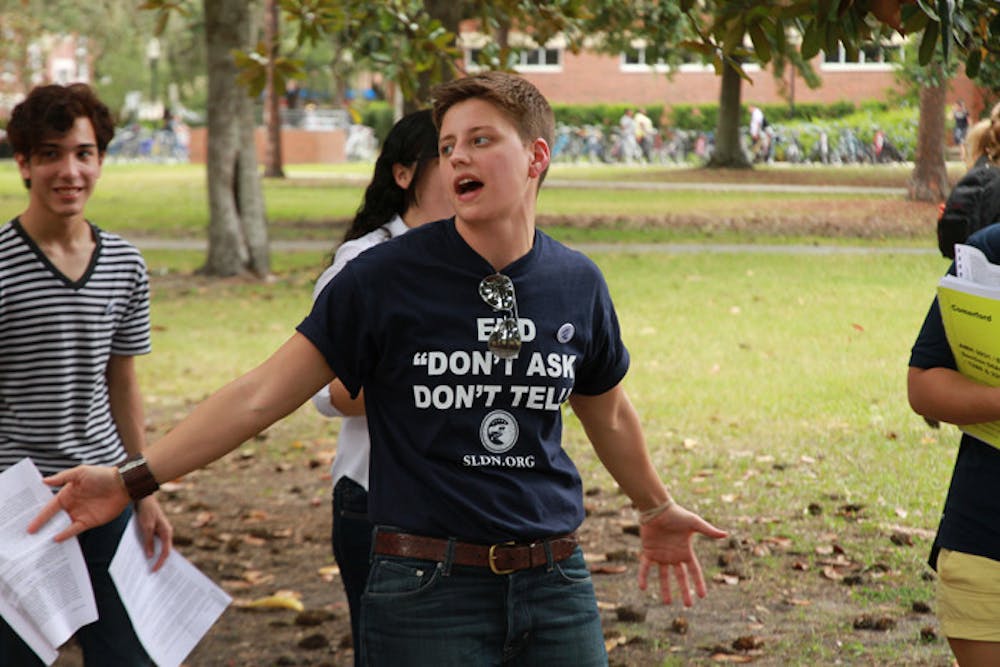Surrounded by about 35 people, 27-year-old Lauren Hannahs joyfully announced "Happy repeal day!"
Hannahs, the director of LGBT Affairs, organized Tuesday's rally to celebrate the end of "Don't Ask, Don't Tell."
The 18-year-old policy disqualified gay people from serving in the military if their sexuality was discovered. Its repeal means openly gay and lesbian service members can serve.
It also means UF's 417 ROTC students can be open about their sexuality without fear of dismissal, said Lt. Col. Matt Hackathorn, public affairs officer for U.S. Army Cadet Command at Fort Knox, Ky.
"I think this is a great day," Hannahs said.
Hannahs organized Tuesday's celebratory rally because the Service Members Legal Defense Network called and said it was organizing a collective repeal rally across the country at college campuses and non-profit organizations.
Four volunteers read stories of service members who had to keep their sexual orientations a secret and published letters that had been sent to the president, pleading for a repeal.
Eugene Hetley Jr., a 35-year-old cultural anthropology junior, shared his experience with the "Don't Ask, Don't Tell" policy during his service as a Cavalry Scout.
"Nobody cares what you do off-duty," Hetley said. "All they want is for you to not engage in conduct that would reflect badly on the unit."
More than 13,000 men and women were removed from the military under the ban, according to The New York Times.
Hackathorn said he couldn't say how many ROTC cadets had been dismissed because of "Don't Ask, Don't Tell."
He added that it was legal for gay or lesbian students to be in ROTC as long as they didn't announce they were gay or weren't caught in an act of homosexuality.
"We didn't ask, and they didn't tell," he said.
Army cadets were required to take training sessions in the spring that discussed respecting one another, he said. The sessions were designed to prepare students for the repeal of the policy.
"Our leadership says it's time for it," said Hackathorn.
Roger Sliney, 25-year-old chemistry junior, worked as an Army intensive-care unit nurse for five years and spent 15 months in Iraq.
He said the people he met while on duty were among the first to completely accept him for being gay.
"We had rifles and were on guard duty together," Sliney said. "They didn't care."
Both Sliney and Hetley said it wasn't common for military personnel to be discharged under the policy. But in one extreme case Sliney witnessed, the service members were asked to donate blood, and one of the drill sergeants took an openly gay service member out of the line.
A study released in 2009 done in part by UF associate professor of psychology Bonnie Moradi suggested that military discipline was not affected when a unit's members knew that one of their fellow service members was gay.
"The culture of ‘Don't Ask, Don't Tell' has gone away," Hannahs said. "Now, the law has caught up with how people are living and treating each other."
Lauren Hannahs, 27, director of LGBT affairs for UF, hosts a rally celebrating the repeal of "Don't Ask, Don't Tell" on Plaza of the Americas on Tuesday.






